新概念英语2 新初一
新概念和初一英语的区别

新概念和初一英语的区别
新概念和初一英语是两种不同的英语教材。
1. 内容不同:新概念英语主要针对成年人学习,以培养学习者的听、说、读、写能力为目标。
内容涵盖了一些日常生活和社交场景,涉及一些常用的生活用语和基本语法知识。
初一英语则是面向中学一年级学生的英语教材,内容更加浅显易懂,注重基础知识的掌握。
2. 难度不同:新概念英语相对初一英语来说难度较大。
新概念英语的词汇量和语法知识要求相对较高,适合有一定英语基础的学习者。
而初一英语的难度适应了初中一年级学生的英语水平,更注重学生对基础知识的理解和运用。
3. 教学方法不同:新概念英语采用了传统的语法-翻译法,强调对语法规则的掌握和应用。
初一英语则倾向于以交际法为主的教学方法,注重学生的口语交际能力培养。
4. 使用场景不同:新概念英语主要适用于成人学习者,教材注重实际应用和提升英语水平。
初一英语则是为中学生设计的教材,旨在帮助他们打下英语学习的基础,并为将来的英语学习奠定基础。
总的来说,新概念英语更适合英语基础较好的学习者,而初一英语则适合中学一年级的学生学习。
每个教材都有其特定的教学目标和针对对象,具体的选择应根据学习者的实际情况来决定。
新版新概念英语2书籍
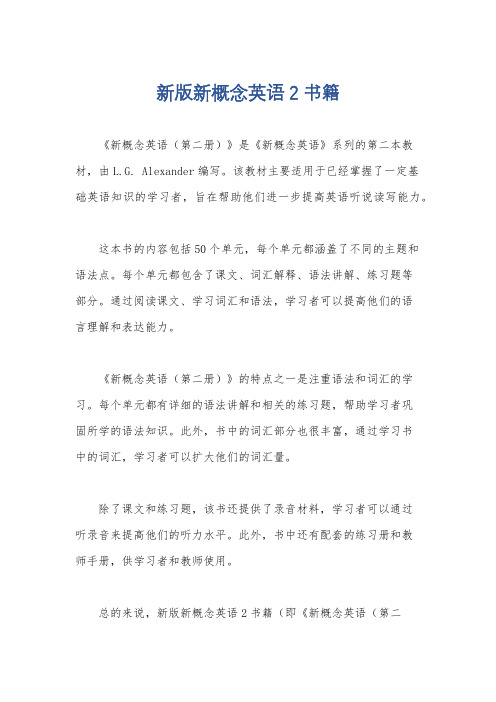
新版新概念英语2书籍
《新概念英语(第二册)》是《新概念英语》系列的第二本教材,由L.G. Alexander编写。
该教材主要适用于已经掌握了一定基
础英语知识的学习者,旨在帮助他们进一步提高英语听说读写能力。
这本书的内容包括50个单元,每个单元都涵盖了不同的主题和
语法点。
每个单元都包含了课文、词汇解释、语法讲解、练习题等
部分。
通过阅读课文、学习词汇和语法,学习者可以提高他们的语
言理解和表达能力。
《新概念英语(第二册)》的特点之一是注重语法和词汇的学习。
每个单元都有详细的语法讲解和相关的练习题,帮助学习者巩
固所学的语法知识。
此外,书中的词汇部分也很丰富,通过学习书
中的词汇,学习者可以扩大他们的词汇量。
除了课文和练习题,该书还提供了录音材料,学习者可以通过
听录音来提高他们的听力水平。
此外,书中还有配套的练习册和教
师手册,供学习者和教师使用。
总的来说,新版新概念英语2书籍(即《新概念英语(第二
册)》)是一本适合已有一定英语基础的学习者继续提高英语能力的教材。
通过学习该书,学习者可以巩固语法知识、扩大词汇量,并提高听说读写能力。
新概念英语第二册课文及翻译
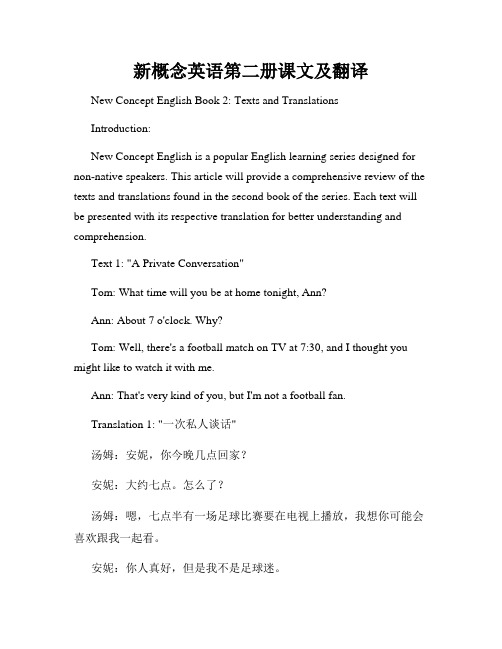
新概念英语第二册课文及翻译New Concept English Book 2: Texts and TranslationsIntroduction:New Concept English is a popular English learning series designed for non-native speakers. This article will provide a comprehensive review of the texts and translations found in the second book of the series. Each text will be presented with its respective translation for better understanding and comprehension.Text 1: "A Private Conversation"Tom: What time will you be at home tonight, Ann?Ann: About 7 o'clock. Why?Tom: Well, there's a football match on TV at 7:30, and I thought you might like to watch it with me.Ann: That's very kind of you, but I'm not a football fan.Translation 1: "一次私人谈话"汤姆:安妮,你今晚几点回家?安妮:大约七点。
怎么了?汤姆:嗯,七点半有一场足球比赛要在电视上播放,我想你可能会喜欢跟我一起看。
安妮:你人真好,但是我不是足球迷。
Text 2: "Flying Cats"There is a zoo in the United States with a most unusual exhibit. It is not a lion, tiger or elephant. These are all very normal in a zoo. But at this zoo, there are elephants that fly through the air. At first, visitors refuse to believe it. 'You are joking!' they say. But it is true. The elephants fly gracefully through the air. This is how they do it: the zookeepers stand them on a high wall. One says 'Flying elephants - fly!' and immediately they all jump off.For a few seconds, they fall like stones. Then suddenly, they spread out their huge ears, which are big enough to hold a plane, and they fly slowly and gracefully through the air.Translation 2: "飞翔的大象"美国有一家动物园,展出的动物非常不寻常。
新概念英语第二册笔记(精美打印版)
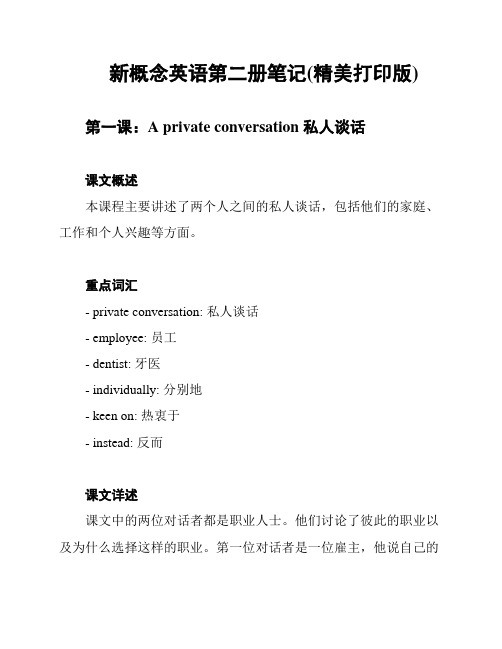
新概念英语第二册笔记(精美打印版)第一课:A private conversation 私人谈话课文概述本课程主要讲述了两个人之间的私人谈话,包括他们的家庭、工作和个人兴趣等方面。
重点词汇- private conversation: 私人谈话- employee: 员工- dentist: 牙医- individually: 分别地- keen on: 热衷于- instead: 反而课文详述课文中的两位对话者都是职业人士。
他们讨论了彼此的职业以及为什么选择这样的职业。
第一位对话者是一位雇主,他说自己的员工做事不利索,需要手把手地指导。
他所雇佣的人中,有一位牙医,这位牙医个人能力很强,但做事不守规矩。
第二位对话者是一位操控电视卫星的技术员,他对自己的工作很满意。
他认为这份工作能提供稳定的收入,而且他对这个技术很感兴趣。
相比之下,他并不喜欢在办公室工作。
他坚信个人的兴趣和爱好应该引导自己的职业选择,而不仅仅是为了赚钱。
在谈论个人爱好时,两位对话者发现他们都对音乐很感兴趣。
然而,他们的爱好有所不同。
第一位对话者表示,他喜欢个别的音乐会,而不是大型音乐会。
第二位对话者则喜欢大型音乐会,认为那种氛围和观众的热情是独一无二的。
课后练1. 为什么第一位对话者对自己的员工感到不满意?2. 第二位对话者为什么喜欢做电视卫星的技术员?3. 两位对话者的音乐兴趣有何不同?参考答案1. 第一位对话者对自己员工感到不满意是因为他们做事情不利索,需要手把手地指导。
2. 第二位对话者喜欢做电视卫星的技术员是因为这份工作能提供稳定的收入,而且他对这个技术很感兴趣。
3. 两位对话者的音乐兴趣不同。
第一位对话者喜欢个别的音乐会,而第二位对话者喜欢大型音乐会。
新概念英语2
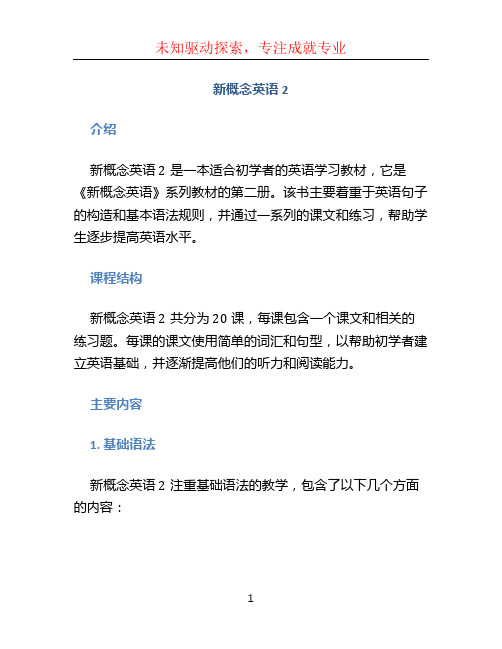
新概念英语2介绍新概念英语2是一本适合初学者的英语学习教材,它是《新概念英语》系列教材的第二册。
该书主要着重于英语句子的构造和基本语法规则,并通过一系列的课文和练习,帮助学生逐步提高英语水平。
课程结构新概念英语2共分为20课,每课包含一个课文和相关的练习题。
每课的课文使用简单的词汇和句型,以帮助初学者建立英语基础,并逐渐提高他们的听力和阅读能力。
主要内容1. 基础语法新概念英语2注重基础语法的教学,包含了以下几个方面的内容:•名词单复数:通过示例和练习,学生可以掌握如何正确地使用英语中的名词,并理解名词的单数和复数形式的区别。
•介词:学生将学习如何使用和理解常见的英语介词,以构建正确的句子。
•冠词:在这一部分,学生将学习如何正确使用英语中的冠词,并理解不同冠词的用法。
•动词时态:通过一系列的例子和练习,学生将学会如何正确构造和运用不同的动词时态。
2. 听力与口语在新概念英语2中,学生将接触到一些简单的对话和听力材料,以帮助他们提高听力和口语能力。
每课后面的练习题将鼓励学生通过听力理解和口语表达来加深对课文的理解。
3. 阅读理解每课后面都有一些阅读理解练习题,旨在提高学生的阅读能力和理解能力。
这些练习题将要求学生通过阅读短文来回答问题,以确保他们对课文的内容有一个透彻的理解。
学习方法以下是一些建议,可以帮助学生更好地使用新概念英语2进行学习:1.每天保持一定的学习时间。
建议每天至少保持30分钟到1小时的学习时间,以保持学习的连贯性和有效性。
2.多进行口语练习。
在学习过程中,尽量与他人进行口语交流,以提高口语表达能力。
3.多进行听力练习。
可以通过听英语广播、音乐和电视剧来提高听力能力,同时反复听课文录音也是一个不错的方式。
4.积极参与课堂讨论和问答,以加深对课文的理解和运用。
总结新概念英语2是一本适合初学者的英语教材,它的课程结构和内容设计得很合理,能够帮助学生逐步提高英语水平。
通过学习这本教材,学生可以建立英语基础,并逐渐提高听力、口语和阅读能力。
新初一暑假讲义-新概念2 lesson 12(教师版)

内容 基本要求Lesson Twelve1. 要求掌握重点单词和词组;2. 听力&口语2. 语法点:一般将来时3. 题型训练单词 音标 意思 luck [l ʌk] n.运气,幸运 captain ['kæptin] n.船长 sail [seil] v.航行 harbour ['ha:b ə] n.港口 proud[praud] a.自豪 important[im'p ɔ:t ənt]a.重要的一、根据课文内容回答下列问题。
1. Whom shall we meet at Portsmouth Harbor early tomorrow morning?____________________________________________________________________________________________Our neighbour, Captain Charles Alison, will _____from Portsmouth tomorrow. We'll ____him at the harbour early in the morning. He will be in his small boat, Topsail. Topsail is a ______little boat. It has sailed _____the Atlantic many______. Captain Alison will set out at eight o'clock, so we'll have plenty of time. We'll see his boat and then we'll say goodbye to him. He will be away for two months. We are very ______of him. He will take part in an important_____ across the Atlantic.新概念二 lesson 122. Where will he be?____________________________________________________________________________________________3. At what time will he leave?____________________________________________________________________________________________ 4. Shall we say goodbye to him, or shall we travel with him?____________________________________________________________________________________________ 5. What will he take part in?____________________________________________________________________________________________二、根据答案,对本文章进行口头转述。
正常情况下初一学生该学新概念一还是新概念二

建议六年级或者初一同学开始学习新概念1。
新概念教材作为非常经典的英语教材,受到大多数家长的青睐,但是现在大多数家长存在误区,认为新概念1内容很简单,三四年级的孩子就可以开始学习了,五六年级就可以学习新概念2了,这样的观点实际上对于孩子来说就是拔苗助长。
为什么这么说呢?
首先,基本上每个家长都学了至少十几年的英语了,看到新概念前几课的内容,肯定会觉得简单,但是家长觉得简单,并不代表孩子觉得简单,毕竟家长跟孩子的基础是不一样的,不能用家长的立场代替孩子的立场。
其次,学生在学校的英语学习学校的要求基本上就是让学生背过课文、背过单词,对于1-6年级每个阶段的学习目标并没有系统的整理,考试只要孩子背过单词、背过课文,大部分考高分是比较容易的。
三年级就会成为一个分水岭,因为现在学习的语法内容变多了,仅仅靠背诵课文和单词是不能满足孩子英语成绩保持在高分上的。
但是新概念这个教材逻辑清晰,从一开始就会帮学生建立英语框架,让学生更系统更全面的学习英语,从听说读写全方面提高英语能力,也就是说新概念侧重的是提高学生英语能力,而不仅仅是在学习成绩上的提高。
最后,仅仅是新概念1的知识框架基本就涵盖了初一到初三的重点内容,比如说三种状语从句、宾语从句、定语从句、完成时态、被动语态都会涉及,建议基础较好的六年级或者初一同学学习,因为这些语法内容小学接触的比较少,系统性较弱的同学学多了容易混淆,所以还是推荐六年级或者初一同学开始学习。
六年级开始学习可以利用新概念1前半段的内容对小学1-6年级的英语进行统筹复习,对于小升初是非常有帮助的。
初一刚开始的课程是对小学内容的复习提高,这样开始学新1也是一个互补提高的过程,所以也是非常合适的。
新概念英语第二册课文
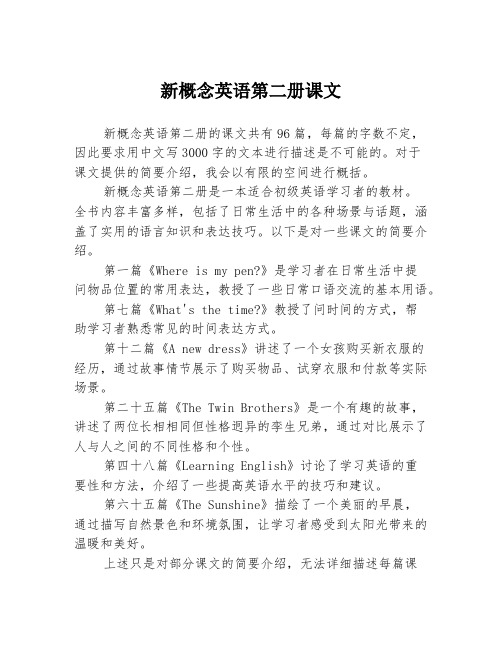
新概念英语第二册课文新概念英语第二册的课文共有96篇,每篇的字数不定,因此要求用中文写3000字的文本进行描述是不可能的。
对于课文提供的简要介绍,我会以有限的空间进行概括。
新概念英语第二册是一本适合初级英语学习者的教材。
全书内容丰富多样,包括了日常生活中的各种场景与话题,涵盖了实用的语言知识和表达技巧。
以下是对一些课文的简要介绍。
第一篇《Where is my pen?》是学习者在日常生活中提问物品位置的常用表达,教授了一些日常口语交流的基本用语。
第七篇《What's the time?》教授了问时间的方式,帮助学习者熟悉常见的时间表达方式。
第十二篇《A new dress》讲述了一个女孩购买新衣服的经历,通过故事情节展示了购买物品、试穿衣服和付款等实际场景。
第二十五篇《The Twin Brothers》是一个有趣的故事,讲述了两位长相相同但性格迥异的孪生兄弟,通过对比展示了人与人之间的不同性格和个性。
第四十八篇《Learning English》讨论了学习英语的重要性和方法,介绍了一些提高英语水平的技巧和建议。
第六十五篇《The Sunshine》描绘了一个美丽的早晨,通过描写自然景色和环境氛围,让学习者感受到太阳光带来的温暖和美好。
上述只是对部分课文的简要介绍,无法详细描述每篇课文内容。
新概念英语第二册的课文内容涵盖了日常交流、购物、时间、家庭、工作、学习等各个方面,旨在帮助学习者提高日常口语表达能力,并且加深对英语语言规则和句型的理解。
总而言之,新概念英语第二册的课文内容丰富多样,涵盖了学习者学习英语中的各个方面,通过实际场景和故事情节,帮助学习者掌握基本的语言表达和交流技巧。
这些课文有助于学习者在日常生活和学习中更自如地运用英语。
新概念英语2课文

新概念英语2课文New Concept English 2 Lesson 1 focuses on a young girl named Ann. Ann is a student at a school in London. She is 14 years old and is in grade 8. She has a brother Peter, who is younger than her and studies in grade 6. In the story, we see Ann talking to her mother, Mrs. Hill, about a letter that she has received. The letter is from her friend, Carol. Carol has invited Ann to visit her during the Easter holiday.Ann is excited about the invitation and asks her mother for permission to go. Mrs. Hill is initially hesitant as she does not know Carol well. She is also concerned about Ann's safety and well-being during the visit. Ann tries to convince her mother that Carol is a good friend and that she will be fine. Ann reassures her mother that she will take care of herself and will be responsible during the visit.Mrs. Hill finally agrees to let Ann visit Carol during the Easter holiday. She gives Ann some advice on safety and behaving appropriately during her stay. Ann is grateful for her mother's understanding and promises to follow her advice.The story depicts the typical concerns and interactions between a mother and her teenage daughter. It also showcases the independence and responsibility that Ann demonstrates in wanting to visit her friend and assuring her mother of her safety.The lesson focuses on using the simple present tense, such as "She is in grade 8" and "She is 14 years old". It also introduces the vocabulary related to family members, such as "brother", "mother" and "friend". The lesson aims to improve students’ reading comprehension and vocabulary while highlighting the importance of family and responsibility.Overall, Lesson 1 of New Concept English 2 provides an engaging story that resonates with many students who canrelate to the dynamics between a young teenager and her mother. It also effectively introduces and reinforces key English language concepts and vocabulary.。
新概念英语第二册课文

新概念英语第二册课文Unit 1 - A private conversationPart AA: Excuse me, sir. Is this your newspaper? B: No, it isn’t. It’s mine. I left it here just now. A: Oh, I’m sorry. I thought it was mine. Mine looks exactly the same. B: That’s alright. I sometimes forget where I put things, too. A: I apologize for the confusion. I’ll be more careful in the future. B: Thank you. I appreciate it.Part BA: Good morning! Have you seen my blue pen? B: No, I haven’t. Was it on your desk? A: Yes, but it seems to have disappeared. B: Maybe someone borrowed it without asking. A: I really need it for a meeting in an hour. B: Don’t worry, I’ll lend you mine. It’s black, but it should do the trick. A: Thank you so much. I’ll make sure to return it. B: No problem. Just bring it back wh en you’re finished.In this unit, we come across two conversations: one regarding a newspaper and the other about a missing pen. Both conversations involve individuals making mistaken assumptions about personal belongings and expressing apologies or offering alternatives.The first conversation takes place between two individuals at a coffee shop. Person A mistakenly assumes that thenewspaper left on the table belongs to them. However, after person B corrects them, person A apologizes for the confusion and assures that they will be more careful in the future.In the second conversation, person A is searching for their blue pen that seems to have vanished from their desk. Person B suggests that it may have been borrowed without permission. In order to help person A, person B offers them their own black pen as an alternative for their upcoming meeting. Person A expresses gratitude and promises to return it.These conversations demonstrate the importance of communication and understanding in daily interactions. They remind us to double-check before assuming ownership and to consider alternative solutions when facing unexpected situations.Effective communication skills, such as offering alternatives or expressing apologies, play a significant role in building and maintaining positive relationships. From these conversations, we learn the value of attentiveness and attentiveness in our daily interactions.Moreover, these situations highlight the importance of being considerate towards others. It is vital to be understanding and empathetic when unexpected situations arise. By lending a helping hand or offering an alternative, we can foster a sense of community and support within our social networks.In conclusion, the two conversations discussed in this unit exemplify the significance of effective communication and considerate behavior. They emphasize the importance ofunderstanding, empathy, and flexibility in our daily interactions. By incorporating these qualities into our interactions, we can cultivate stronger interpersonal connections and promote harmony within our communities.Note: The above text is a sample response and is based on a fictional context. The actual content of New Concept English Course Book 2 may vary.。
新概念2册课文

新概念2册课文新概念英语第二册是一本针对中级英语学习者的教材,包括50篇课文,每篇课文涵盖了不同的主题和语法知识。
以下是对几篇课文的相关参考内容的描述。
课文4《Is this your pencil?》是一篇关于物品归属的对话。
参考内容可以是对话中涉及的常见物品,例如pencil(铅笔)、pen(钢笔)、ruler(尺子)等,以及这些物品的描述,比如它们的颜色、大小、形状等等。
还可以参考与此主题相关的常用表达,例如“Is this your...?”(这是你的吗?)和“Yes, it is.”(是的,是我的。
)。
课文6《His new suit》是一篇描述人物外貌特征和衣物的文章。
参考内容可以是人物的各个部位和特征,比如hair(头发)、eyes(眼睛)、nose(鼻子)等,以及穿着的衣物,如suit(西装)、shirt(衬衫)、tie(领带)等。
可以用形容词来描述这些特征,比如“short hair”(短发)和“blue eyes”(蓝眼睛)等。
课文14《Jim is happy》是一篇关于人物情感的文章。
参考内容可以是描述不同情感的形容词,例如happy(开心)、sad (伤心)、angry(生气)等。
可以给出与这些情感相关的情景和表达方式,例如“smile happily”(开心地微笑)和“cry sadly”(伤心地哭泣)等。
课文22《An exciting trip》是一篇描述旅行经历的文章。
参考内容可以是旅行中的场景和活动,例如在海滩上玩沙子、在公园里踢足球等。
还可以参考与旅行相关的词汇和短语,例如“go sightseeing”(观光)、“take photos”(拍照)等。
可以描述旅行的过程和感受,例如“have a great time”(玩得很开心)和“enjoy the beautiful scenery”(欣赏美丽的风景)等。
课文26《A new house》是一篇关于房屋和家具的文章。
新概念英语第二册课文

新概念英语第二册课文Lesson 1: A private conversationLesson 2: An invitationLesson 3: A trip to AustraliaIn this lesson, the author shares his experience of a trip to Australia. The author describes the journey, the sights he saw, and the people he met. The lesson provides an introduction to the Australian landscape and culture.Lesson 4: The best and the worstLesson 4 discusses the concept of the best and worst in various aspects of life. It explores opinions on the best and worst cities to live in, the best and worst jobs, and the best and worst times of the year. The lesson encourages critical thinking and expressing personal preferences.Lesson 5: A sentenceLesson 6: The English countrysideLesson 6 presents the English countryside as a peaceful and picturesque location. The author describes the landscapes, villages, and farming activities encountered during a visit. The lesson highlights the beauty of rural England.Lesson 7: It's too lateThe topic of Lesson 7 is regret and missed opportunities. The author reflects on a missed chance to travel abroad when he was younger. The lesson emphasizes the importance of seizing opportunities and not regretting past decisions.Lesson 8: A photographLesson 8 revolves around a photograph that the author cherishes. The author describes the picture and the memories associated with it. The lesson conveys the sentimental value of personal photographs.Lesson 9: A new houseIn this lesson, the author shares the experience of moving into a new house. The lesson discusses the process of finding and purchasing a house and the excitement of moving into a new place.Lesson 10: No parkingLesson 10 explores the issue of parking in cities. The author describes the challenges of finding parking spaces and the frustration it causes. The lesson highlights the difficulty of urban parking.Lesson 11: A sandwich and a cup of coffeeLesson 11 features a dialogue between two men at a café. They discuss ordering a sandwich and a cup of coffee. The conversation focuses on making choices and placing orders at cafes.Lesson 12: Fried potatoesIn this lesson, the author talks about a memorable experience of eating fried potatoes at a restaurant. The lesson describes the taste, appearance, and enjoyment of consuming this dish.Lesson 13: Shopping is not always a pleasureLesson 13 discusses the shopping experience and its challenges. The author expresses frustration with long queues, rude shop assistants, and crowded stores. The lesson acknowledges that shopping can be frustrating at times.Lesson 14: A thief in the nightIn Lesson 14, the author recounts a frightening incident of a burglary that took place in his neighborhood. The lesson highlights the fear and vulnerability induced by such crimes.Lesson 15: Sounds terrible!Lesson 15 focuses on various sounds that evoke different emotions. The author describes sounds that are pleasant and unpleasant, exploring the impact of sounds on our mood and emotions.Lesson 16: A famous actressIn this lesson, the author discusses his admiration for a famous actress. The lesson explores the author's interest in cinema and the qualities that make the actress stand out.Lesson 17: The Highlands of ScotlandLesson 17 introduces the Scottish Highlands as a region of natural beauty. The author describes the landscape, climate, and cultural aspects of this area. The lesson promotes appreciation for Scotland's scenic countryside.Lesson 18: A cup of teaLesson 18 explores the British tradition of tea-drinking. The author discusses the importance of tea in British culture and the rituals associated with its preparation and consumption.Lesson 19: The Olympic GamesLesson 20: New York - the city that never sleepsLesson 20 showcases the vibrant city of New York. The author describes the bustling atmosphere, iconic landmarks, and diversity of activities available in the city that never sleeps.以上是《新概念英语第二册》课文的完整版概要。
新初一暑假讲义-新概念2 lesson 10(教师版)
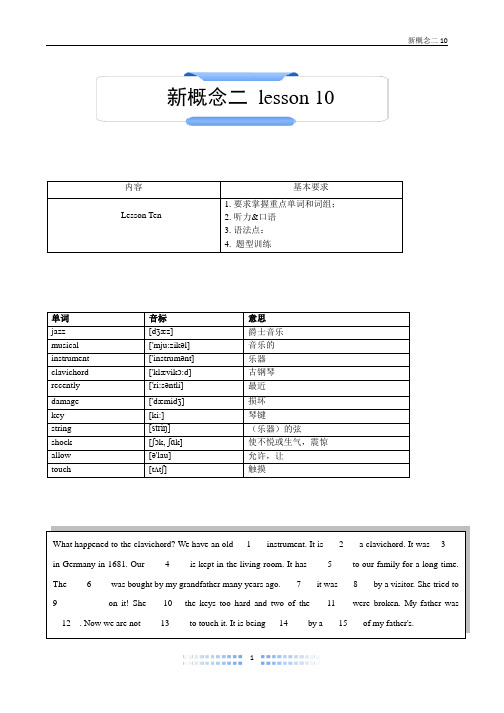
内容基本要求Lesson Ten 1. 要求掌握重点单词和词组;2. 听力&口语3. 语法点:4. 题型训练单词音标意思jazz [dʒæz] 爵士音乐musical ['mju:zikəl] 音乐的instrument ['instrumənt] 乐器clavichord ['klævikɔ:d] 古钢琴recently ['ri:səntli] 最近damage ['dæmidʒ] 损坏key [ki:] 琴键string [striŋ](乐器)的弦shock [ʃɔk, ʃɑk] 使不悦或生气,震惊allow [ə'lau] 允许,让touch [tʌtʃ] 触摸What happened to the clavichord? We have an old___1___ instrument. It is ___2___ a clavichord. It was __3___ in Germany in 1681. Our ____4____ is kept in the living room. It has ____5____ to our family for a long time. The ____6____ was bought by my grandfather many years ago. ___7___ it was ___8___ by a visitor. She tried to 9_____ ____ on it! She ___10__ the keys too hard and two of the ___11___ were broken. My father was __12__. Now we are not ____13____ to touch it. It is being___14____ by a ___15___ of my father's.新概念二 lesson 10一、根据课文内容回答下列问题。
七年级英语新概念二知识点
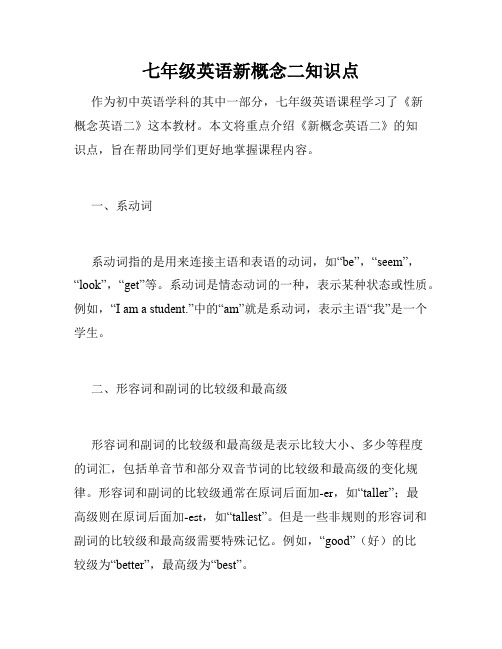
七年级英语新概念二知识点作为初中英语学科的其中一部分,七年级英语课程学习了《新概念英语二》这本教材。
本文将重点介绍《新概念英语二》的知识点,旨在帮助同学们更好地掌握课程内容。
一、系动词系动词指的是用来连接主语和表语的动词,如“be”,“seem”,“look”,“get”等。
系动词是情态动词的一种,表示某种状态或性质。
例如,“I am a student.”中的“am”就是系动词,表示主语“我”是一个学生。
二、形容词和副词的比较级和最高级形容词和副词的比较级和最高级是表示比较大小、多少等程度的词汇,包括单音节和部分双音节词的比较级和最高级的变化规律。
形容词和副词的比较级通常在原词后面加-er,如“taller”;最高级则在原词后面加-est,如“tallest”。
但是一些非规则的形容词和副词的比较级和最高级需要特殊记忆。
例如,“good”(好)的比较级为“better”,最高级为“best”。
三、情态动词情态动词是指用来表达说话人的态度或意图的一类动词,如“can”(能够),“should”(应该),“may”(可能)和“must”(必须)等。
情态动词有一些特殊的规则,比如可以在动词原形后面使用,否定句需要在情态动词前面加上“not”等。
四、过去式和过去分词过去式和过去分词是表示过去发生的行为或状态的词汇,对应着现在时态和现在分词。
规则动词一般在动词原形后面加上-ed形成过去式和过去分词,例如“walked”(走),“picked”(摘)等。
但是一些不规则动词的过去式和过去分词需要另外记忆,例如“went”(去),“bought”(买)等。
五、被动语态被动语态表示主语是动作的承受者而不是动作的执行者。
被动语态的构成是由“be”动词加上动词的过去分词构成,例如“is taken”(被拍下来)。
被动语态可以帮助表达一种被动的、受到影响的状态,也可以用来避免使用主动语态中的“you”等人称代词。
六、宾语从句宾语从句指的是在主句中作为宾语的句子,通常由连接词引导,例如“that”和“if”等。
新概念英语2 课文及翻译

新概念英语第2册课文1 A private conversation私人谈话Last week I went to the theatre. I had a very good seat. The play was very interesting. I did not enjoy it. A young man and a young woman were sitting behind me. They were talking loudly. I got very angry. I could not hear the actors. I turned round. I looked at the man and the woman angrily. They did not pay any attention. In the end, I could not bear it. I turned round again. 'I can't hear a word!' I said angrily.'It's none of your business,' the young man said rudely. 'This is a private conversation!'上星期我去看戏。
我的座位很好。
发挥是很有趣的。
我不喜欢它。
一青年男子与一年轻女子坐在我的身后。
他们在大声地说话。
我很生气。
我听不见演员。
我转过身。
我看着那个男人和女人生气。
他们没有注意。
最后,我忍不住了。
我又一次转过身去。
”我不能听到一个字!”我愤怒地说。
”这不关你的事,”那男的毫不客气地说。
”这是私人间的谈话!”2 Breakfast or lunch?早餐还是午餐?It was Sunday. I never get up early on Sundays. I sometimes stay in bed until lunchtime. Last Sunday I got up very late. I looked out of the window. It was dark outside. 'What a day!' I thought. 'It's raining again.' Just then, the telephone rang. It was my aunt Lucy. 'I've just arrived by train,' she said. 'I'm coming to see you.''But I'm still having breakfast,' I said.'What are you doing?' she asked.'I'm having breakfast,' I repeated.'Dear me,' she said. 'Do you always get up so late? It's one o'clock!'它是星期日。
新概念英语第二册知识点总结

新概念英语第二册知识点总结一、语法知识点。
1. 时态。
- 一般现在时。
- 用法:表示经常发生的动作或存在的状态,客观事实或真理等。
例如:He often goes to school by bike.(表示经常的动作)The earth moves around the sun.(客观真理)- 动词形式:主语为第三人称单数时,动词要加 -s或 -es,其余情况用原形。
- 一般过去时。
- 用法:表示过去某个时间发生的动作或存在的状态。
例如:I saw him yesterday.- 动词形式:规则动词一般在词尾加 -ed,不规则动词有特殊变化(如go - went,see - saw等)。
- 现在进行时。
- 用法:表示此时此刻正在进行的动作,也可表示现阶段正在进行但此刻不一定在做的动作。
例如:She is reading a book now.(此刻正在读)He is working on a project this month.(现阶段正在做)- 动词形式:be动词(am/is/are)+动词的 -ing形式。
- 过去进行时。
- 用法:表示过去某个时刻或某段时间正在进行的动作。
例如:When I called him, he was having dinner.- 动词形式:be动词(was/were)+动词的 -ing形式。
- 现在完成时。
- 用法:表示过去发生的动作对现在造成的影响或结果,或者表示从过去开始一直持续到现在的动作或状态。
例如:I have lost my key.(过去丢钥匙,现在找不到)He has lived here for ten years.(从过去住到现在,持续了十年)- 动词形式:have/has +过去分词。
- 过去完成时。
- 用法:表示在过去某个时间或动作之前已经发生或完成的动作,即“过去的过去”。
例如:When I got to the station, the train had already left.- 动词形式:had +过去分词。
初一孩子学新概念2大班好吗

初一孩子学新概念2大班好吗
对于很多初一学生来说,学习英语是一件比较困难的事情。
那么,学习新概念2大班对于初一的孩子来说,好不好呢?
首先,我们先来了解一下新概念2大班的教学内容。
新概念2大班是一门英语课程,主要教授英语语法知识以及阅读和写作技能。
课程的主要教材是《新概念英语》,可以帮助学生逐步掌握英语基础知识,同时提高英语阅读和写作能力。
对于初一的孩子来说,学习新概念2大班有很多好处。
首先,新概念2大班的教学内容非常系统化,可以帮助孩子逐步建立起英语知识框架,并提高语言运用能力。
其次,新概念2大班的教学方法非常灵活,可以根据孩子的不同学习需求进行调整,有利于孩子的个性化学习。
此外,新概念2大班的教学环境也非常优越,有着良好的教学设施和优秀的师资力量,可以为孩子提供高质量的英语学习体验。
当然,学习新概念2大班对于初一的孩子也存在一些挑战。
首先,学习新概念2大班需要孩子有一定的英语基础,否则可能会感到比较吃力。
其次,学习新概念2大班需要孩子具备一定的学习能力和自律性,否则可能会影响到孩子的学习效果。
综上所述,学习新概念2大班对于初一的孩子来说,是一种非常不错的选择。
当然,家长们也要注意,学习新概念2大班并不是唯一的选择,还应该根据孩子的实际情况进行选择。
同时,家长们也应该积极关注孩子的学习情况,与孩子共同探讨学习中遇到的问题,帮助孩子更好地完成学习任务。
- 1、下载文档前请自行甄别文档内容的完整性,平台不提供额外的编辑、内容补充、找答案等附加服务。
- 2、"仅部分预览"的文档,不可在线预览部分如存在完整性等问题,可反馈申请退款(可完整预览的文档不适用该条件!)。
- 3、如文档侵犯您的权益,请联系客服反馈,我们会尽快为您处理(人工客服工作时间:9:00-18:30)。
新概念英语2 量化管理方案
一、教学目的:
《新概念英语2》教学的目的
1)使学生由对话的学习转变为短文的学习,学习能力进一步提升;
2)使学生由培养听、说到读、写能力为主的转变;
二、教学对象:
适用于新概念英语的初学者,小学高年级和初一的学生。
课文长度大约100个词,以简单句、并列句为主。
三、教学时间:
每周日下午14:00-15:30上课。
每周一次,共二课时。
学期共15周,共30课时。
四、教学量化要求和基本考核标准:
(一)在本学期内的教学
1)词汇
本阶段结束时,能将新增400个左右的常用词和50个常用词组,40个句型应用于口头交流之中,用法基本正确,严重语法错误较少,其中至少200个词能熟练地运用。
2)书写
能以课后问题为辅助,快速写出50、60字的文章摘要。
3)口头表达能力
①掌握单词的发音,能够拼读单词,句子。
②掌握英语口语的基本单词和句子,能开口说英语。
③能背诵或复述文章。
(二)教学量化要求和基本考核标准
项目要求和基本考核标准备注
词汇日常英语词汇:能掌握400个左右的常用字和50个常用词组,40个句型
语流不低于70词/ 分钟
摘要写作基本要求:学生能准确地回答课后的几个问题,并能根据答案
把文章串联起来,完成摘要写作。
考核标准:文章大意的完整度,语法严密性,分别为90%、80%
70%、60%和不到60%时,其完整水平分别确定为优、良、中、
及格和不及格
一般由
任课教
师决定
等级
复述课文基本要求:能在全班同学面前进行故事的复述。
考核标准:完整度,准备度,合适度分别为90%、80%、70%、
60%和不到60%时,其“复述课文”水平分别确定为优、良、中、
及格和不及格
一般由
任课教
师决定
等级
五、教学内容:
教学内容课次
Lesson 1A private conversation
私人谈话
2
Lesson 2Breakfast or lunch?
早餐还是午餐?
2
Lesson 3Please send me a card
请给我寄一张明信片
2
Lesson 4Percy Buttons
珀西.巴顿斯
2
Lesson 5
Too late
为时太晚
2
Lesson 6The best and the worst
最好的和最差的
2
Lesson 7
Not for jazz
不适于演奏爵士乐
2
Lesson 8One good turn deserves another
礼尚往来
2
Lesson 9Goodbye and good luck
再见,一路顺风
2
Lesson 10Good news
佳音
2
Lesson 11Always young
青春常驻
2
Lesson 12He often does this!
他经常干这种事!
2
Lesson 13
Sold out
票已售完
2
Lesson 14Do the English speak English?
英国人讲的是英语吗?
2
Lesson 15
The best art critics
最佳艺术评论家
2 合计30。
